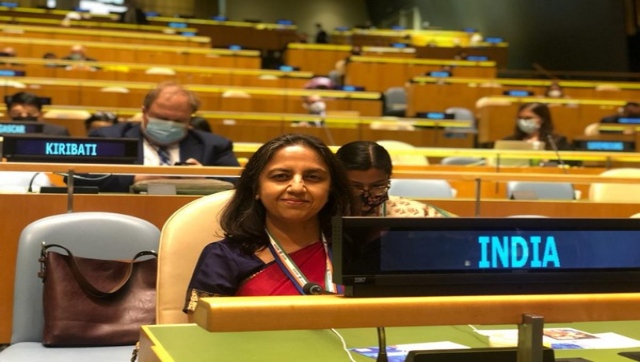United Nations: Dealing with the issue of climate security, which is just one aspect of climate change, in the UN Security Council is not desirable, India said on Thursday as it cautioned that viewing conflicts in poorer parts of the world through the prism of climate change will only serve to present a lop-sided narrative. Secretary (West) in the Ministry of External Affairs Reenat Sandhu said here that the issue of climate change is being discussed in a focussed manner by the United Nations in the relevant mechanisms and whether it is climate change, bio-diversity, desertification or others, mechanisms have been put in place to take further action. Given this background, picking one aspect of climate change, namely climate security, and dealing with it in this forum, which is not geared to tackle a multi-faceted problem of this nature, would not be desirable, Sandhu said at the UN Security Council high-level Open Debate on Maintenance of International Peace and Security (Climate and Security). She said bringing climate security into the Security Council discourse, ignoring basic principles and practices relating to climate change, has the potential to disrupt the nature of the overall discussion on this extremely important topic. When we deliberate the securitisation of climate, we should be careful not to build a parallel climate track. We need to continue on the path of inclusive decision making, which member states have already agreed to, Sandhu said. She also emphasised that while climate change has impacted the lives of people and exacerbated conflict, to view conflicts in poorer parts of the world through the prism of climate change will only serve to present a lop-sided narrative when the reasons for the conflict are to be found elsewhere. Sandhu referred to the report of the Intergovernmental Panel on Climate Change, which also clearly states that the effect of climate variability on violence is contested. Climate change may enhance conflict, but cannot be determined as a reason for it, she said. A study of Nationally Determined Contributions (NDCs) also indicates that while parties do acknowledge the adverse effects of climate change on their economies, we need to be conscious while looking at it as a risk to their social stability or as an issue of peace and security. Over-simplification of causes of conflict will not help in resolving them nor can it justify extreme policy measures, she added. Sandhu emphasised that over the last several decades, member states have engaged purposefully and in a focussed manner to put in place commitments relating to mitigation, adaptation, financing, technology transfer so that climate change can be addressed holistically. The Paris Agreement also clearly brings out the interconnectedness of these issues under the United Nations Framework Convention on Climate Change (UNFCCC). The measures to tackle climate change have been built on an integrated structure, so that it is equitable to all parties, especially developing countries, Sandhu said, adding that addressing one aspect of climate change and ignoring others will be counter-productive. Climate action needs to be based on fundamental and agreed principles, the most important of which is the principle of Common but Differentiated Responsibility and Respective Capabilities’, she said. Sandhu told the Council that India is a leader in Climate Action and is on track to meet its commitments under the Paris Agreement. India currently has the world’s fastest-growing solar energy programme and has expanded access to clean cooking fuel to cover over 80 million households making it one of the largest clean energy drives globally. Apart from domestic actions, India has also taken a lead in bringing together international coalitions to generate long-term impact through partnerships, she said, terming the International Solar Alliance (ISA) “a leading example” of how collective action translates into positive global climate impact. The Alliance is among the fastest growing International Organisations today with 80 members and 24 more joining. She said India has set aside 1.6 billion dollars under its soft loans to supplement such efforts. The Coalition for Disaster Resilient Infrastructure (CDRI) is another successful initiative for enhancing cooperation and building resilience against natural disasters. India has allocated 70 million dollars to support the work of the CDRI. India and Sweden have launched the Leadership Group on Industry Transition (Lead IT) with the support of the World Economic Forum in 2019, providing a platform for energy-intensive industries to progress on low-carbon pathways. India is also one of the 10 global champions for energy transition. What we need now is to enhance action on all important policies that address climate change, including fulfilling the commitments on climate finance and technology transfer, Sandhu said, adding that for vast numbers of developing countries, especially during the pandemic when financing is drying up, robust financing for climate action cannot be overemphasised. She stressed that while we may call for innovative financing, we need to be careful not to indulge in innovative accounting. Pathway to 100 billion dollars of climate finance is critical for meeting targets under the Paris Agreement.
India said cautioned that viewing conflicts in poorer parts of the world through the prism of climate change will only serve to present a lop-sided narrative
Advertisement
End of Article


)

)
)
)
)
)
)
)
)



